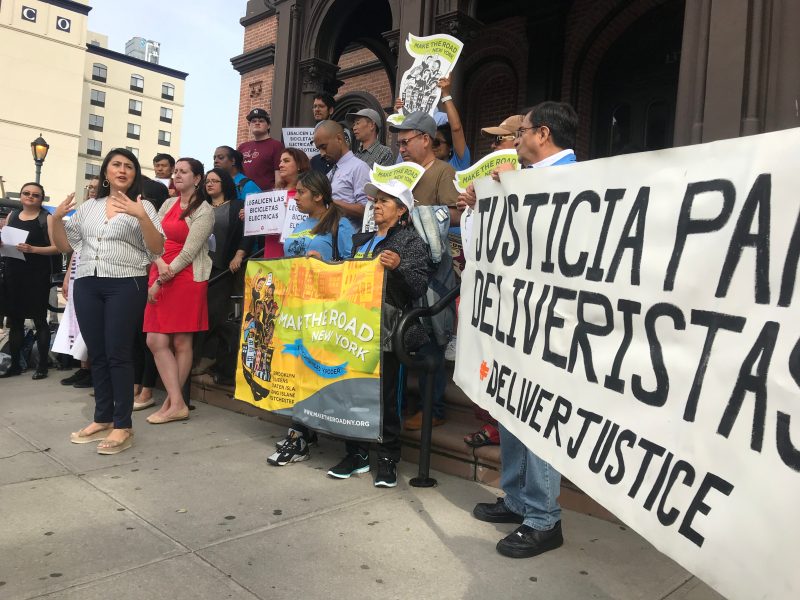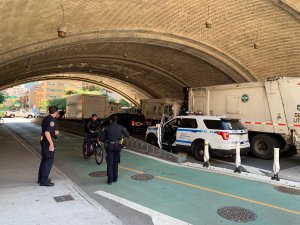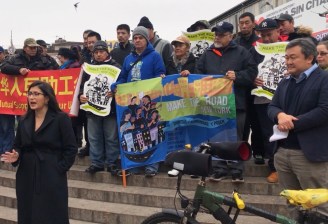Virtually No One Can Understand ‘Fairest City’ Mayor de Blasio’s Crackdown on E-Bikes

“I simply don’t know why.”
That was State Senator Jessica Ramos’s comment when Streetsblog asked her why progressive Mayor de Blasio, who champions New York as “America’s Fairest Big City,” continues to order the NYPD to seize the e-bikes of delivery workers and hit them with fines that are the equivalent of a week’s pay.
The workers, Ramos pointed out, are among the lowest paid in the city and are performing a rush delivery service sought by the well-to-do.
“There is no data to support that these are dangerous vehicles,” Ramos said, just before a State Senate hearing in Flushing on her bill to legalize e-bikes. “We are further criminalizing poverty in a way that is unjust in a city that is supposedly a pro-immigrant city — and in many ways it is, but not in this way. And that needs to change.”
Ramos called de Blasio’s crackdown “a grave injustice,” adding that her legislation “would ensure that the $500 tickets issued by the NYPD would finally come to an end.”
Ramos was certainly not alone in using the occasion of the rare locally conducted state hearing to slam de Blasio’s policy.

Mel Gonzalez of Make The Road NY unfurled a sheath of four, $138 summonses that a delivery worker received on the way to the hearing. Two of the tickets were for the very violations that would be obviated by Ramos’s bill: riding an unregistered motorbike (because e-bikes cannot currently even be registered under DMV rules) and operating without a license (cyclists don’t need them, but motorcyclists do).
“State law creates a gray area,” Gonzalez said. “And every cop knows he can pull people over because these bikes can’t be registered. So it’s easy money. New York State benefits from this gray area, extracting millions of dollars from some of the most-vulnerable people in the state, yet everyone benefits from the work these people do. Even the mayor has gotten deliveries from workers on e bikes.”
To supporters of Ramos’s bill, that’s not just hypocritical, it’s disgraceful.
“The crackdown continues the horrible tradition of discrimination of immigrants,” said Do Lee of the Biking Public Project, which advocates for delivery workers.
There is obviously a political calculation going on for the mayor — who does indeed hear from constituents who sincerely, but wrongly, believe that cyclists present a serious threat on New York’s roadways, where drivers killed more than 200 people last year and cyclists killed none. So Streetsblog asked Council Member Rafael Espinal what he thinks is going on in the West Wing of City Hall.
Signing on today!
— Sen. Mike Gianaris (@SenGianaris) June 7, 2019
“To this day, I’m just confused,” said Espinal, who has a local bill that would require the Department of Transportation to fund the conversion of the currently illegal bikes into legal, pedal-assist bikes. “The bikes are not any more dangerous than a conventional bike. the injured that the policy is having on workers is clear. To this day, I’m just baffled why the mayor doesn’t see that. … Delivery workers are being hurt.”
At the hearing itself, many delivery workers testified to their horrible working conditions in all weather, bemoaned the crackdowns that rob them of their livelihoods and spoke of injuries received from poor roads and random car doors. Ramos asked one worker — who came to the hearing with his own stack of tickets — if the NYPD officers are respectful when they stop cyclists.
“Police officers from the 13th Precinct and the 17th Precinct may be racially biased when they stopped us,” said the worker, Jin Hua Li. “And there were instances when the officers confiscated bikes that had been modified into legal bikes. The precinct ignored [us]. Police officers should protect us, but they charge us.”
The testimony appeared to deeply affect Transportation Committee Chairman Tim Kennedy (D-Buffalo).
“It really brings it home to hear that you get $500 tickets, which can truly devastate a family,” he said.

But the bill is also receiving support from the business community, which has been inconsistent on cycling in general, with some merchants claiming that bike lanes, for example, hurt their bottom lines. John Choe of the Greater Flushing Chamber of Commerce testified that cycling does just the opposite.
“We support the full legalization [because] these micro-mobility technologies … support local economic development, especially small business owners who would benefit from increased foot traffic,” he said. “If New York were to fully legalize these new transportation options, e-scooters and e-bikes could become an affordable, reliable, and viable option for the New Yorkers who need them the most: low-income residents, low-wage workers, and business owners struggling to make ends meet.”
Choe’s group is one of roughly a dozen business organizations that have come out in support of the bill. Officials from Lime, a scooter and bike-share company, have been pitching such comments to show the broad support for the bill. The business groups mostly focused on mobility issues, as scooters and e-bikes would help commuters in “transit desserts.”
“Lacking access to quick and reliable transportation limits the ability of those who live in these outlying communities to share in … economic resurgence,” said Hope Knight, president and CEO of the Greater Jamaica Development Corporation.
Officials from Lime and Bird, another scooter company, were also on hand to call for legalizing the devices they hope to deploy in the thousands on New York City streets. Even though the firms need legalization to boost their bottom lines, the topic of justice for workers was not far in the background.
“Legalizing micro-mobility options, such as e-bikes and e-scooters, will greatly improve the daily lives of New Yorkers — including delivery workers, and others who rely on these options to make a living,” Phil Jones, senior director for Strategic Development and Government Relations at Lime, said in prepared remarks distributed before he testified.
He said the bill, if passed, would allow Lime and other companies to “provide New Yorkers the freedom to get around their own city regardless of their background, bank account or ZIP code.”
De Blasio has consistently justified his crackdown because throttle-controlled electric bikes are currently illegal (indeed, just as the hearing started, the 70th Precinct tweeted images of its latest crackdown). But last week, he appeared to back the Ramos bill, saying, “My hope is that the legislature will act … to come up for a regulatory approach that makes sense or to defer to localities and let localities figure out that regulatory approach.”
That said, Connie Fishman, executive director of Hudson River Park Friends, testified that she does not want the waterfront park’s extremely well-used greenway included in the bill.
“The greenway … has never allowed motorized vehicles on it. It is not a street,” she said. “Adding electric bikes and e-scooters to this already complicated mix [of users] will make it even more dangerous for the 17 million annual park visitors. … The bikeway is very narrow.”
She did not call for widening the bike path. But she did condemn the installation of extra security bollards that have made the bike and pedestrian path ever more congested.
“This has made walking and biking side-by-side impossible,” she said. “The bollards are a major safety concern.”
Under questioning from Ramos, park officials admitted that there have been only two crashes this year involving e-bikes along the greenway — the busiest in the nation.
“The problems you cite are not related to e-bikes,” added State Senator John Liu, who was also on hand as a member of the Senate Transportation Committee. He disagreed that the greenway needed to be carved out of the bill, as e-bikes could later be regulated by the city if the Ramos bill passes.




